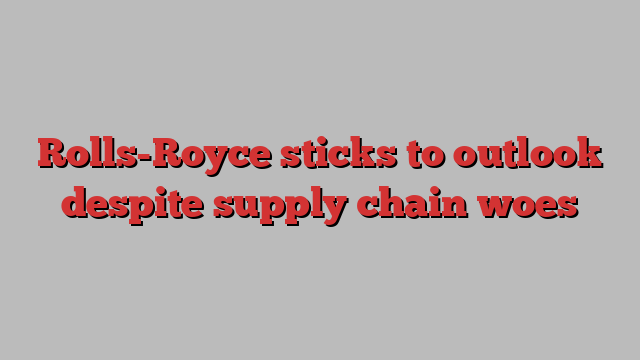
Unlock the Editor’s Digest for free
Roula Khalaf, Editor of the FT, selects her favourite stories in this weekly newsletter.
Rolls-Royce has stuck to its guidance for profit growth this year as a surge in international travel continues to drive demand for its aircraft engines despite persistent supply chain challenges.
Shares in the FTSE 100 group, which had fallen nearly 4 per cent in early morning trading on Thursday, pared some of their losses by the afternoon.
The stock, which hit a new 52-week high of 572.8p on Wednesday, has nearly doubled since the start of the year as investors bought into the turnaround plan under chief executive Tufan Erginbilgiç. The company in August said it would resume dividend payments for the full year.
Rolls-Royce on Thursday reiterated its goal of delivering underlying operating profit of £2.1bn to £2.3bn and free cash flow of as much as £2.2bn for the full year.
The company said large engine flying hours — a key metric as Rolls-Royce makes most of its money from servicing and maintaining its engines when they are in operation — grew 18 per cent year on year to 102 per cent of 2019 levels for the 10 months to the end of October. It expects engine hours to reach 100 to 110 per cent of 2019 levels for the full year.
Analysts at Shore Capital said engine flying hours were towards the lower end of guidance, which “may require modest downgrades”.
Erginbilgiç cautioned that the supply chain environment “remains challenging”. A range of issues including labour shortages and a lack of parts have hampered the industry’s attempt to increase production. The company said it was focusing on 15 suppliers to improve performance.
The aerospace industry was among the hardest hit by the Covid-19 pandemic but bounced back sharply amid resurgent demand from airlines for new aircraft amid a post-pandemic travel boom.
Rolls-Royce has said it will invest more than £1bn over the coming years to improve the durability and performance of its Trent family of engines which power long-haul passenger planes such as Boeing’s 787 and the Airbus A350. It said on Thursday it was also continuing to invest to increase its maintenance and overhaul capacity by 2030.
The group said demand across its other two main divisions, defence and power systems, had also remained strong.
It also confirmed that it had closed down its electric aircraft activities after its Advanced Air Mobility division was put up for sale by Erginbilgiç last year.
Under Erginbilgiç’s predecessor, Warren East, the company had touted investments in electric aviation as one route in which the aviation industry could decarbonise. Three years ago, the company’s electric aircraft Spirit of Innovation broke the electric air speed record.
Rolls-Royce earlier this year also severed its ties with air taxi start-up Vertical Aerospace which is seeking emergency funding.
The FTSE 100 group has a medium-term goal of achieving up to £2.8bn in annual operating profit and up to £3.1bn free cash flow by 2027.